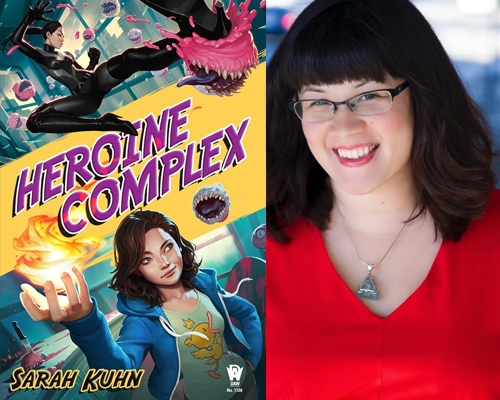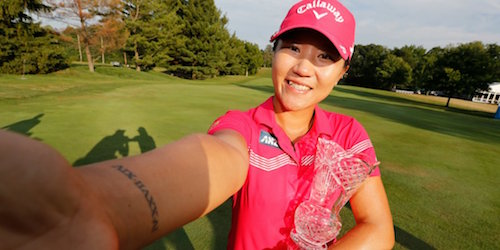In Sarah Kuhn’s fantastical world of supernatural humans and demon portals in an otherwise-modern-day San Francisco, Asian American women are the ones leading the charge in the fight against evil (or, in this case, evil cupcakes.)
The rollicking, comedic “Heroine Complex,” released earlier this month, is the first book in a trilogy about two lifelong friends, Annie “Aveda” Chang and Evie Tanaka – one a worshipped superhero in black spandex and the other a wallflower personal assistant who, as it turns out, has enough fire in her – literally! – to light up the world.
After spending years hiding her powers, and taking care of the aftermath mess from Annie’s superhero exploits, Evie finds herself pushed into navigating through the semi-normal (learning how to stand up for herself and fighting a growing attraction to a co-worker) as well as the outright weird (think supernatural karaoke battles) in a race against time to end a demonic invasion. It is, as Kuhn calls it, a story “about Asian girls just having fun.”
The story grew out of Kuhn’s own experiences being a “hapa” – in her case, half-Japanese and half-white – and of her fascination with what goes on behind the scenes after any comic book hero saves the city: Who cleans up all that debris and goo?
From there, the writing came naturally, especially when she made the decision to write her main characters as Asians, something she said never occurred to her even with her first novel, “One Con Glory,” which had the geek fandom buzzing upon its 2010 release. In that work, her protagonist’s race is never brought up. Kuhn said she had internalized the assumption that the lead of any story was white.
“I think it’s very important to be able to see yourself in the center of a story,” Kuhn said. “If you don’t, you don’t know it’s possible. Growing up, I didn’t know that, and I feel like I didn’t know you can write characters like you, or, and it’s cheesy, but that you can be the protagonist of your own life.”
When Kuhn realized that readers of “One Con Glory” were imagining her leading girl, Julie, as Asian American, the wheels in her head clicked. “I thought, I should just make [Evie] Asian. What am I so afraid of? Then I was empowered by my decision. It’s really centered on what I want to see as both a writer and a viewer,” Kuhn said.
A lot of the story stems from Kuhn’s own childhood going to school in a small, mostly white town. As five-year-olds, Annie and Evie are brought together by default as the only Asian American kids in their class, and made inseparable after Annie defends Evie’s spam musubi while the other kids mock it as “human meat.” The two bond over movies like “The Heroic Trio,” where they find solace and inspiration in strong Asian women.
Kuhn is a self-described nerd and former entertainment journalist whose writing credits include IGN.com’s sci-fi section, Backstage and the official Star Trek site. She said her two leading girls embody both sides of her psyche – She gave Evie her hapa background, as well as a junk food addiction and the tendency to, at most times, be the “opposite of a kick-ass.” Annie is a tightly self-controlled perfectionist, with the type of discipline Kuhn’s mother might have envisioned for her.
Kuhn said her “classic Asian tiger mom” raised her with the, “If you can’t be the best at something, then what’s the point?” mentality. “It meant I had to work hard for what I wanted, and a lot of that is reflected in Annie,” she said.
Jason Chan, who is also Asian American, illustrated the book cover and understood the importance of making Annie and Evie look the way they were described, and not white-washing them, Kuhn said.
The book also serves as an ode to San Francisco, a place Kuhn sees both as a representation of coming of age in her twenties, and as the naturally quirky and colorful home for a book about the supernatural.
And more is coming – Kuhn is planning at least two more books, the next one slated for July 2017 and written from Annie’s POV. In the meantime, her other projects include a short story about an Asian American couple, “Ruby Equation,” for the “Fresh Romance” anthology, as well as a series for the Barbie comic Papercutz.







